After 200 years of shielding itself from the outside world, Japan was forced to end its policy of seclusion on 29 July 1858, when it somewhat reluctantly signed the Treaty of Amity and Commerce with the United States.
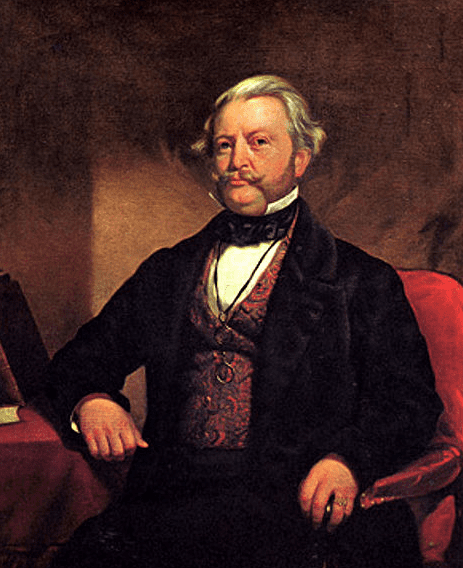
This treaty, negotiated by U.S. Consul General Townsend Harris, was the culmination of the U.S. effort to force open Japan begun by the arrival of Commodore Matthew C. Perry and a naval fleet that arrived in Uraga Harbor (Tokyo) on 8 July 1853. It was Perry who demonstrated the might of American naval power, but it was Harris who exacted the unequal treaty heavily slanted toward U.S. interests.
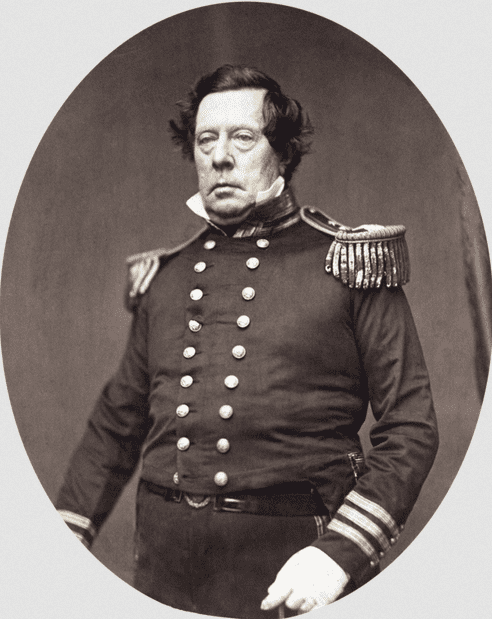
The agreement Perry secured (the Treaty of Amity and Friendship, concluded on 31 March 1854) basically secured rights to coal so that American ships could refuel, and guaranteed that shipwrecked American sailors would not be harmed. Perry’s treaty did partially open Japan to U.S. trade through the ports of Shimoda and Hakodate, but it was Harris, after two years of hard negotiating with a reluctant Japanese government, who secured American trading rights.
His treaty “of Amity and Commerce” forced the Japanese to open up five major ports to American trade, settle for a minor import tax on foreign goods, and allow American merchants and officials to live in Japan. Harris, who sniffed at the “very peculiar” laws of Japan, insisted that U.S. citizens living in Japan should be exempt from such laws and protected by consular jurisdiction – a policy known as extraterritoriality. Recognizing that a war with the U.S. would be futile, the Japanese gave in, signing the treaty and abandoning their cherished policy of seclusion.
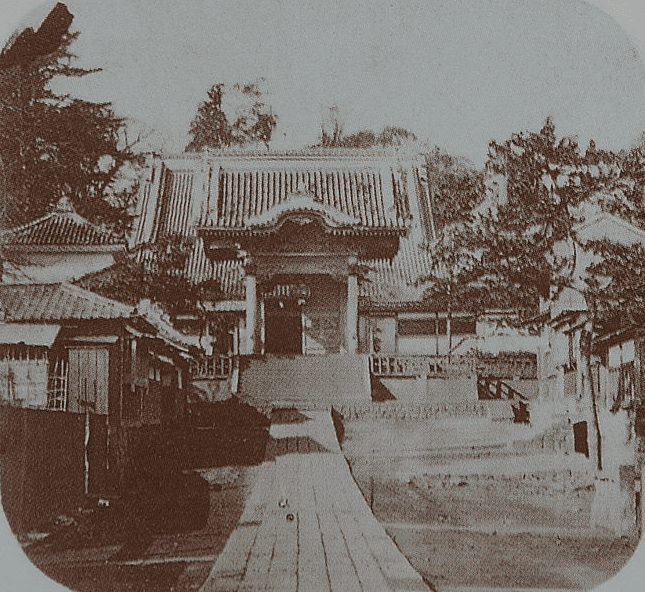
The following three newspaper articles about the Treaty of Amity and Commerce reveal much about America’s attitude toward Japan during the 1850s. Note references to Japan as “this land of heathenism and idolatry” and “semi-barbarous.” The last article in particular is very interesting, as it presents a historical summary of relations between the Western World and the Far East, and concludes that the U.S. treaty with Japan is important for “our Pacific empire.”
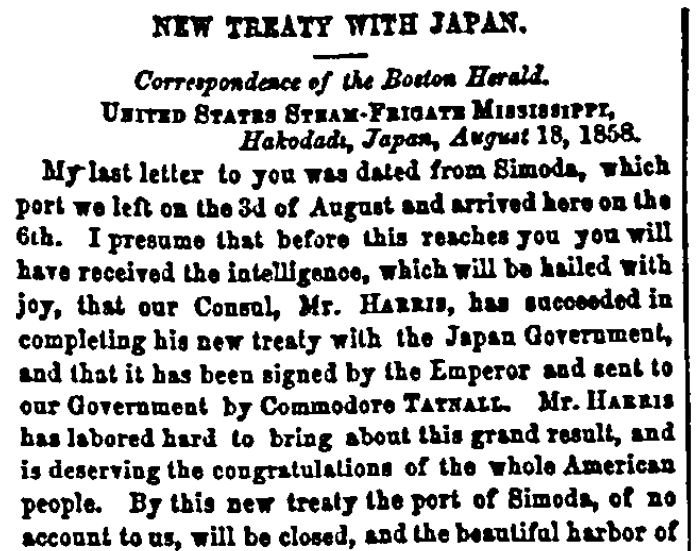
Here is a transcription of this article:
NEW TREATY WITH JAPAN.
Correspondence of the Boston Herald.
United States Steam-Frigate Mississippi,
Hakodadi, Japan, August 18, 1858.
My last letter to you was dated from Simoda, which port we left on the 3d of August and arrived here on the 6th. I presume that before this reaches you you will have received the intelligence, which will be hailed with joy, that our Consul, Mr. Harris, has succeeded in completing his new treaty with the Japan Government, and that it had been signed by the Emperor and sent to our Government by Commodore Tatnall. Mr. Harris has labored hard to bring about this grand result, and is deserving the congratulations of the whole American people. By this new treaty the port of Simoda, of no account to us, will be closed, and the beautiful harbor of Lanagua, only twelve miles from the city of Jeddo, is to be opened to us for commerce, &c. After the treaty is ratified that portion will be the residence of Mr. Harris. It is a beautiful harbor, easy of access at all times of the year, well protected from all storms, and is not like that of Simoda, surrounded at its extremes by sunken rocks. It is also capable of containing a large number of ships, while that of Simoda is not large enough to allow more than three or four ships to ride at anchor at the same time. Its proximity to the Court of Jeddo will also make it convenient for Mr. Harris.
The Japanese Government has decided to send an Ambassador to Washington in March next, on the condition that our Government will convey him and his suite to Panama in a Government ship en route for the United States. I learn that Mr. Harris and Commodore Tatnall assured the authorities of Jeddo that it would be gratifying to the United States Government and its people to comply with this request, and that the return mail would no doubt bring orders to that effect.
Sunday, August 1st, was an interesting one at Simoda. At ten o’clock A.M. all the boats of the Powhatan and of this ship were seen pulling to the landing near the Consul’s residence, one mile from Simoda proper, filled with officers and men, among whom were Com. Tatnall, Captain Nicholson, and the Rev. Mr. Wood, Chaplain of the Powhatan. This large party, numbering four hundred, proceeded to the Consul’s residence for the purpose of attending divine worship of Almighty God on Japanese soil. It was an interesting time to us all, and the very idea of being able to worship the Most High in this land of heathenism and idolatry was extremely gratifying. Here, on the very soil from which the decree has gone forth for centuries to the world that, if the Almighty God himself, or man, or the devil should dare to step foot on Japanese soil to preach the religion of the Most High, they should pay the forfeit of their lives; here it was that, on the 1st day of August, 1858, four hundred American officers and seamen worshipped the true God without being molested or losing a head. Rev. Mr. Wood gave his text from Thessalonians I, chapter I, verses IX and X, and hymns 107 and 113 from the Episcopal common prayer-book were sung with much effect by the choir of the Powhatan. The Chaplain’s discourse was a beautiful and eloquent one, and was listened to for an hour with the utmost silence by the American hearers, while a vast crowd of Japanese gathered around the building to watch our movements. He remarked that it was the happiest day in his life, and said that he should write back to his friends among the hills of New England, and tell them that he had preached the Gospel on this soil without molestation. The ice is now broken, and Americans are now allowed to land, to preach, to trade, and have their Consuls in Japan. In ten years from this time the sons of Columbia will be as numerous in Japan as at the Sandwich Islands.
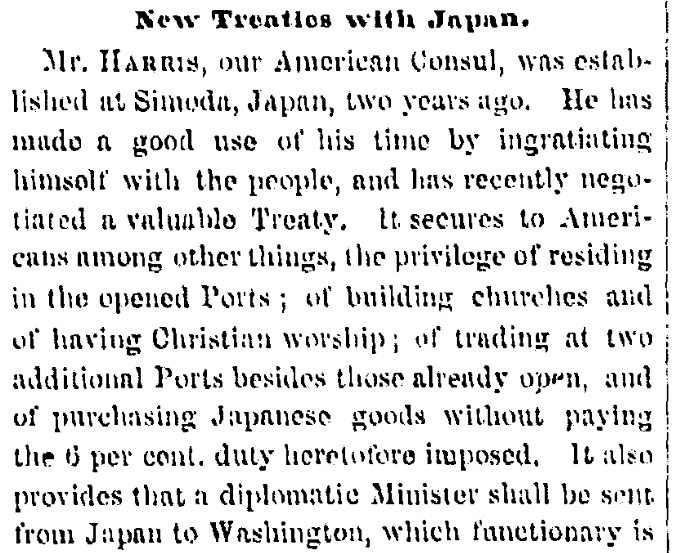
Here is a transcription of this article:
New Treaties with Japan.
Mr. Harris, our American Consul, was established at Simoda, Japan, two years ago. He has made a good use of his time by ingratiating himself with the people, and has recently negotiated a valuable Treaty. It secures to Americans among other things, the privilege of residing in the opened Ports; of building churches and of having Christian worship; of trading at two additional Ports besides those already open; and of purchasing Japanese goods without paying the 6 per cent. duty heretofore imposed. It also provides that a diplomatic Minister shall be sent from Japan to Washington, which functionary is expected to set out next Spring.
…These important concessions open a wide field for commerce and enterprise and can hardly fail to lead eventually to the breaking down of the barrier between Japan and the rest of the civilized world. There will be a great curiosity to see the first Japanese Envoy that has ever left his native shores.
The accounts given by Mr. Harris and other Americans, show that many of our preconceived notions regarding Japan are as erroneous as were those regarding China. Instead of desiring to exclude foreign trade, the Government is anxious to cultivate it. Instead of repressing the desire of the populace for intercourse with strangers, it is the populace which restrains the Government. The rulers are disposed to be liberal, while the people insist upon exclusion. Instead of living in Oriental pomp and splendor surrounded by a harem, the Emperor lives plainly, has but one legal wife, and an income of about five hundred dollars a year. Instead of being bigoted and ignorant of outside affairs, the nobility take the papers, read the news, and know generally what is going on in the world. Instead of shuddering at the idea of going among “foreign barbarians,” there is likely to be a warm contest among several Princes for the honor of being Minister to Washington. And finally, instead of overweening self-confidence in their power, they actually made overtures to Mr. Harris to know if we would not help them in case they got into difficulty with England or France.
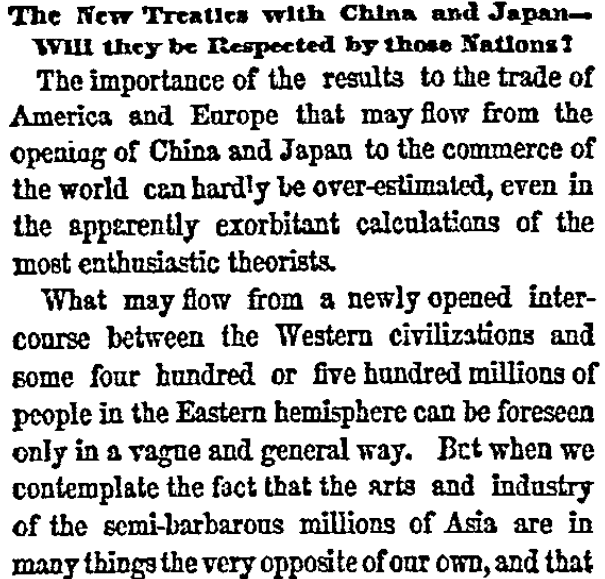
Here is a transcription of this article:
The New Treaties with China and Japan –
Will They Be Respected by Those Nations?
The importance of the results to the trade of America and Europe that may flow from the opening of China and Japan to the commerce of the world can hardly be overestimated, even in the apparently exorbitant calculations of the most enthusiastic theorists.
What may flow from a newly-opened intercourse between the Western civilizations and some four hundred or five hundred millions of people in the Eastern hemisphere can be foreseen only in a vague and general way. But when we contemplate the fact that the arts and industry of the semi-barbarous millions of Asia are in many things the very opposite of our own, and that this difference is the greatest element of trade, we will perceive the simple fact that vast changes must come to commerce through it, standing out in bold relief. In fact, our intercourse with the Far East, limited as it has been, was the great fountain from which the present trade of the world first sprung. To it do we owe the three great world staples – silk, sugar and cotton. The first has been domiciled in Southern Europe, but the others lie at the very foundations of American industry and American power. For their development a new continent was required as soon as our intercourse with China and Japan were cut off. There are not a few who, in view of the past, steadfastly believe that the new treaties with those countries will not be fulfilled, and that both the Chinese and Japanese have made them in bad faith. A cursory examination of the past will throw no little light upon the probable future.
Our first knowledge of those countries came from the travels of the Polo family, of Venice. Their narratives were not believed, however, until the Portuguese doubled the Cape of Good Hope, in the beginning of the sixteenth century. Commerce entered at once upon the newly opened field; but commerce was not then the science and power it is today. It was conducted upon the old theories of monopoly and protection. Every trader was impressed with the idea that what he gained somebody lost, and what anybody else gained was his loss. Commerce at that time, fearing to stand alone, sought a coadjutor in religious propagandism. The missionary went hand in hand with the merchant. Christianity found an abundant field to reap; but its teachers soon became overbearing to a high degree. They were self-sacrificing, holy men, of the most ardent stamp; and they hated each other and the non-believing Asiatics with an intensity like that which animated the bosoms of the burners of Huss, Hooker and the victims of the Holy Inquisition. This led to their partial extermination and final expulsion in both China and Japan.
But the case is different now. Since that time commerce has learned different theories, and found other and wiser allies than the teachers of religion. It is no more one nation seeking to drive out its compeers, or one monopolist seeking to exclude some other. Instead of the Dutch and the Pagans uniting to exterminate the Portuguese and the native Christians, neither Dutch nor Portuguese are known in the movement. The four great living Powers of the earth appeared together before the gates of these Eastern empires, and they have been opened to them. They have made stipulations in favor of commerce, in which each participates with all; and these stipulations are supported by something very different from holy men, who deem it doing a service to heaven to burn each other at the stake. These facts are known to the Chinese and Japanese, however limited their knowledge of European civilization may be, and their import will not be lost upon them. Even should they be disposed to evade the treaty stipulations, it would be a short war that would bring them to their senses. But we do not believe they wish to do so. All testimony goes to prove that they are eminently an industrial and commercial people – quick to observe and imitate our mechanical appliances. We are told, moreover, that the American name has obtained a greater influence and more favorable reception among them than that of any European nation. This may account for the spite of the London Times at Mr. Reed. It is also said that a minister from Japan will cross the Pacific Ocean and come to Washington. This single fact proves their appreciation of geographical relations, and points to our Pacific empire as the future seat of the commerce with those nations. There we have already San Francisco, known as the New York of the Pacific, and our empire will soon stretch southward till it embraces some of the Isthmus routes. The great advantage, then, of the opening of Japan and China will redound to us; and upon us may yet devolve the diplomatic or belligerent task of keeping them open to the world.
Note: An online collection of newspapers, such as GenealogyBank’s Historical Newspaper Archives, is not only a great way to learn about the lives of your ancestors – the old newspaper articles also help you understand American history and the times your ancestors lived in, and the news they talked about and read in their local papers.
